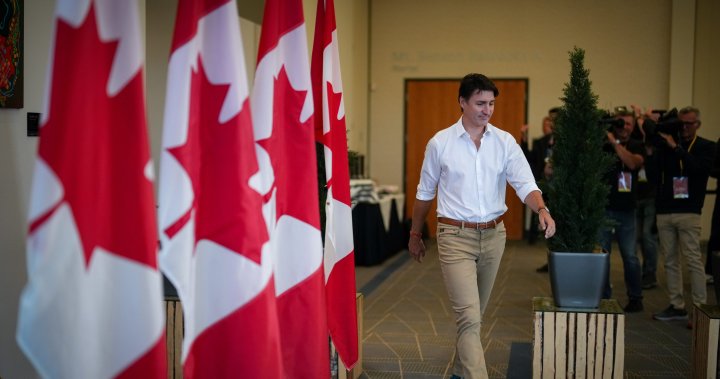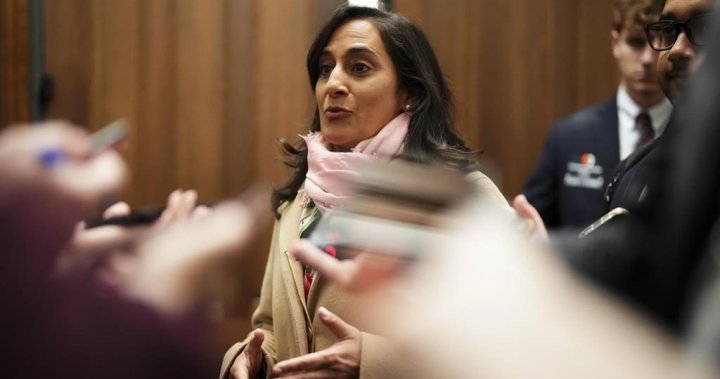More than half of Canadians don’t want early election: Ipsos poll – National

A small majority of Canadians want opposition parties to work with the Liberals rather than call a snap election, a new poll suggests, despite persistently low approval of the prime minister Justin Trudeau.
The Ipsos poll, conducted exclusively for Global News between September 6 and 10, and released Wednesday, gauged Canadians’ views on the new political reality after NDP pulls out of supply and confidence deal which allowed the Liberals to remain in power until next fall.
The end of the affair makes the prospect of early elections more likelyNDP Leader Jagmeet Singh acknowledged after “tearing up” the deal last week, and Conservative Leader Pierre Poilievre is urging his fellow opposition leaders to quickly bring down the government after the House of Commons resumes Monday.
But Ipsos found that 56 per cent of Canadians surveyed do not want the election to happen yet, saying they want all parties to try to work with the government on a case-by-case basis.
Only in Alberta and Saskatchewan did a majority of respondents say they wanted the opposition to bring down the government “as soon as possible.”
Singh said he would approach all votes in the House of Commons on a case-by-case basis and declined to say definitively whether he would support a motion of no confidence if one were brought forward.
He said Wednesday he would “not listen” to Poilievre after the Conservative leader pledged to bring forward a no-confidence motion “as soon as possible” and challenged Singh to vote with him in favour.

Even though Canadians aren’t calling for an election, the same poll found that Canadians remain bitter toward Trudeau and the Liberals. Only 28 per cent of those polled nationally believe Trudeau deserves to be re-elected, a figure that holds true across all regions.

Get the latest national news
For news that impacts Canada and the world, sign up to receive breaking news alerts directly when it happens.
The Conservatives hold a nearly 20-point lead at 45 per cent to the Liberals’ 26 per cent, while the NDP — which presents itself as the only party capable of competing with the Conservatives after ending the supply and confidence agreement — is at just 16 per cent in Wednesday’s poll.
The situation is different only in Quebec, where the Bloc Québécois obtained 34 percent of support, compared to 25 percent for the Liberals and 23 percent for the Conservatives.
Canadians surveyed by Ipsos don’t believe the Liberals’ fortunes will change if Trudeau steps down. A majority (47%) of respondents said the party would fare the same with a new leader, while only 28% said it would fare better.
The poll was released as the Liberals and NDP hold their annual caucus retreats.
Speaking to reporters earlier Wednesday, Trudeau struck a confident tone about the upcoming fall session of parliament and said he and his party would be able to present an effective contrast to the Conservatives.
“The reality is that we are all focused on what needs to be done to ensure that Canadians are supported and have confidence in the future,” Trudeau said.

Despite the frustrations expressed by Liberals in reports before the retreat and the concerns expressed by some during it, other Liberals who spoke publicly on the sidelines of the meetings expressed optimism about their party’s approach to the upcoming election year and about Trudeau remaining at the helm.
The Liberals face their next test in a few days with two more crucial byelections in Montreal and Winnipeg.
Trudeau says voters in these byelections and the next national election will have to choose between Poilievre’s plan to cut services and the Liberal plan to invest in Canada.
Here are some of the results from an Ipsos poll conducted between September 6 and 10, 2024, on behalf of Global News. For this poll, a sample of 1,000 Canadians aged 18 and older were surveyed online. Quotas and weighting were used to ensure that the sample composition reflects the Canadian population according to census parameters. The precision of Ipsos online polls is measured using a credibility interval. In this case, the poll is accurate to within ±3.8 percentage points, 19 times out of 20, if all Canadians aged 18 and older had been surveyed. The credibility interval will be wider among subsets of the population. All polls and sample surveys are subject to other sources of error, including, but not limited to, coverage error and measurement error.
— with documents from The Canadian Press
© 2024 Global News, a division of Corus Entertainment Inc.



















